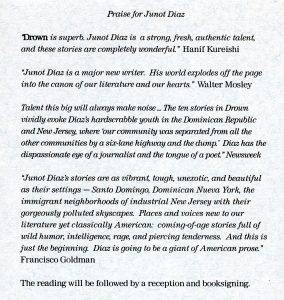This week we highlight the reflections of Rutgers University student Julia Bonavitacola on her internship in Special Collections this summer . . .
One thing that I have learned from my time in the Walsh Library archives is how close twenty-six miles really is. It has amazed me how often Seton Hall University and Rutgers University have overlapped in the past, not just on the basketball court but in the people that have frequented both places.
The past few weeks of diving through Seton Hall University’s archives has presented an interesting perspective on how Seton Hall has thrived the past twenty-five years as well as provided me with interesting posters and programs to pore over. But I’m an English major at Rutgers University, my heart has always been in finding anything pertaining to literature and the campus on the banks of the Raritan. I have not been disappointed.
While sorting through archival papers, a program caught my eye. The annual “Poetry in the Round” was held at the Bishop Dougherty Student Center on April 29, 1996. And who should be the featured author but Rutgers alum Junot Diaz, come to read from his then newly released book of short stories Drown and snippets from works in progress.

Junot Diaz was often talked about in my creative writing classes. A story of someone from New Jersey becoming a writer, who took the same classes as we did and, perhaps, even sat in the same seats. When Creative Writing students felt like they couldn’t make it, we could always look to Junot Diaz. His Pulitzer Prize winning novel The Brief Wondrous Life of Oscar Wao is always stocked in the bookstore and English majors around campus recommend it any time you need a new book. The mentions of Rutgers, the EE bus, Demarest Hall and College Ave sprinkled throughout the novel gave us Rutgers students a chance to relate. A chance to relate to a man whose career started just the same as ours.
Given the inexplicable relationship Rutgers English and Creative Writing majors have with Junot Diaz, it was astounding to me to see he had come to read at Seton Hall. Of course, Rutgers doesn’t have exclusive rights to Diaz; his work is out in the world for all to read. But the idea that Diaz could be championed by New Jersey natives from all walks of life, whether they were born in New Jersey or in another country like Diaz, made me realize that we can all relate to the themes of Diaz’s work. The feelings of not knowing our identity, trying to fit in, the fear of dying before we’ve really lived. These themes aren’t exclusive to the creative writing classrooms in the basement of Murray Hall, these are themes that run across all of the United States, a whole generation of students currently sitting in classrooms just like the ones that Diaz himself sat in.

Yes, twenty-six miles isn’t all that big. So, in 1996, when Junot Diaz was reading his short stories, the distance between Rutgers and Seton Hall became insignificant. Literature connects us like no other medium, bringing age groups from across vast distances together like no other. That night in 1996, Diaz was shrinking the cultural gap, the language barrier and the twenty-six-mile gap between Seton Hall and Rutgers, until everyone was boiled down to their simplest form: human beings experiencing the same world that Diaz encountered. And at the end of the day, that’s what matters more than any distance.